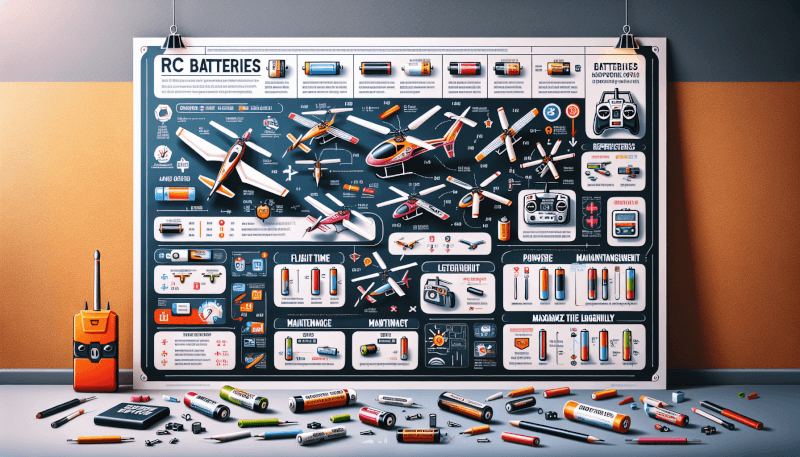Are you a proud owner of an RC helicopter and in need of a new battery? Look no further, as this article will guide you through the process of selecting the right battery for your beloved aerial companion. From understanding the different battery types to considering size and weight, we’ll explore all the essential factors that will help you make an informed decision. So, if you want to maximize the performance and longevity of your RC helicopter, read on to discover the secrets of picking the perfect power source.
Understanding the Importance of Choosing the Right Battery
Why choosing the right battery is crucial for your RC helicopter
When it comes to operating your RC helicopter, choosing the right battery is of utmost importance. The battery serves as the powerhouse for your aircraft, providing the necessary energy to keep it flying. Selecting the wrong battery can have serious consequences, compromising the performance and safety of your RC helicopter. Therefore, taking the time to understand the importance of choosing the right battery is crucial for a smooth and enjoyable flying experience.
The impact of using the wrong battery
Using the wrong battery for your RC helicopter can have various negative impacts. Firstly, it can result in poor performance, causing your aircraft to have reduced power and agility. This can significantly affect your flying experience, making it less enjoyable and limiting your ability to perform certain maneuvers. Additionally, using an incompatible battery can lead to a shorter flight time, leaving you with less time in the air before needing to recharge or replace the battery. Furthermore, the wrong battery can pose safety risks, such as overheating or even causing a fire. Therefore, understanding the impact of using the wrong battery is essential for the overall functionality and safety of your RC helicopter.
Identifying the Battery Specifications
Voltage requirements
One crucial specification to consider when choosing a battery for your RC helicopter is its voltage requirements. Different RC helicopters have varying voltage needs, and using a battery with an incorrect voltage can lead to damage or even total malfunction of your aircraft. To determine the voltage requirements, refer to the manufacturer’s guidelines or consult the instruction manual for your RC helicopter. It’s essential to match the battery voltage to these requirements to ensure optimal performance and avoid any potential issues.
Capacity and discharge rate
Apart from voltage, the battery’s capacity and discharge rate are equally important considerations. Capacity refers to the amount of charge the battery can store, typically measured in milliampere-hours (mAh). Higher-capacity batteries can power your RC helicopter for a more extended period before requiring a recharge. Discharge rate, on the other hand, indicates the maximum amount of current the battery can deliver. It’s essential to choose a battery with a discharge rate capable of meeting the demands of your RC helicopter’s motor. Failure to do so may result in underperformance or even damage to the battery.
Physical dimensions and weight constraints
Another factor to take into account when selecting a battery for your RC helicopter is its physical dimensions and weight constraints. RC helicopters have limited space for battery placement, and using a battery that is too large or heavy can disrupt the balance of the aircraft or make it difficult to fit into the designated compartment. Be sure to consider the physical dimensions and weight limitations provided by the manufacturer to ensure a proper fit and optimal weight distribution.
Connector types
Connector types play a crucial role in linking the battery to your RC helicopter’s electronics. There are several types of connectors available, such as Deans, XT60, EC3, and more. It is essential to choose a battery with a connector that matches the one used in your RC helicopter. Using incompatible connectors may require additional adapters or modifications, which can introduce unnecessary complexity and potential points of failure. By selecting a battery with the correct connector type, you can ensure a secure and reliable connection, enabling smooth and uninterrupted power flow to your aircraft.

Matching Battery Type with RC Helicopter
Determining the appropriate battery chemistry
When selecting a battery for your RC helicopter, it’s crucial to consider the appropriate battery chemistry. There are several types of battery chemistries commonly used in RC helicopters, including nickel-metal hydride (NiMH), lithium-ion polymer (LiPo), and lithium iron phosphate (LiFePO4). Each chemistry has its own specific characteristics, advantages, and limitations. Consider factors such as energy density, voltage stability, weight, and discharge capabilities when deciding which battery chemistry is best suited for your RC helicopter.
NiMH batteries are known for their lower cost and ease of use, making them a popular choice among beginners. They offer stable voltage output throughout the discharge cycle but have a lower energy density, which means they may require more frequent recharging. LiPo batteries, on the other hand, provide higher energy density, allowing for longer flight times. However, they require strict monitoring during charging and storage to prevent overcharging or mishandling, which can lead to safety hazards. LiFePO4 batteries strike a balance between the high energy density of LiPo batteries and the safety and stability of NiMH batteries, making them a reliable option for intermediate and advanced users.
Considerations for beginners, intermediate, and advanced users
In addition to battery chemistry, it’s essential to consider the skill level of the user when choosing a battery for an RC helicopter. Beginners may benefit from starting with NiMH batteries due to their simplicity and forgiving nature. These batteries are less likely to suffer from mishandling or overcharging mistakes that can occur during the learning process.
Intermediate users may choose to explore LiPo batteries as they offer increased energy density and longer flight times. However, it’s important for intermediate users to develop a good understanding of proper charging and storage practices to ensure safe usage.
Advanced users have more flexibility and can explore different battery chemistries based on their specific needs and preferences. They are typically experienced in handling various battery types and have a deep understanding of the associated risks and safety precautions.
Matching the battery type with your skill level can enhance your overall aircraft performance, as well as ensure a safe and enjoyable flying experience.
Evaluating Battery Performance
Understanding battery performance ratings
Battery performance ratings provide valuable information about the capabilities of a battery. These ratings can include parameters such as continuous discharge current, burst discharge current, and internal resistance. Continuous discharge current denotes the maximum current that the battery can supply consistently without overheating or sustaining damage. Burst discharge current refers to the maximum current that the battery can deliver for short durations. Internal resistance indicates how efficiently the battery can transfer energy. Understanding battery performance ratings can help you choose a battery that meets the power demands of your RC helicopter, ensuring optimal performance without risking damage.
Checking battery efficiency
Battery efficiency is an essential aspect to consider when evaluating battery performance. Efficient batteries convert stored energy into usable power with minimal energy losses. Higher efficiency means more power is available for your RC helicopter, resulting in improved flight times and overall performance. When comparing batteries, consider the efficiency ratings provided by the manufacturer to make an informed decision about which battery will provide the most efficient power delivery for your RC helicopter.
Assessing voltage sag and runtime
Voltage sag is a common issue experienced during high-current draws, typically during intense maneuvers or sudden acceleration. It occurs when the internal resistance of the battery causes a temporary drop in voltage. Voltage sag can significantly impact the performance of your RC helicopter, resulting in reduced power output or even intermittent cut-offs. Thus, it’s important to assess the voltage sag characteristics of a battery before making a purchase. Consider batteries with lower internal resistance as they tend to exhibit less voltage sag, ensuring a consistent power supply during demanding flight maneuvers.
Runtime is another crucial factor to consider when evaluating battery performance. It refers to the duration for which the battery can provide power to your RC helicopter before requiring a recharge. Longer runtimes allow for more extended flight sessions without interruptions. Take note of the battery’s capacity and discharge rate to estimate the runtime that best suits your flying needs.

Considering Battery Longevity and Maintenance
Examining battery life cycles
Battery life cycles refer to the number of charge and discharge cycles a battery can undergo before its capacity begins to significantly degrade. Different battery chemistries have varying life cycle characteristics, and understanding them can help you anticipate the longevity of a battery. NiMH batteries typically have a higher number of life cycles, often ranging from 300 to 500 cycles. LiPo batteries, on the other hand, have a shorter lifespan, usually between 150 to 300 cycles. Carefully consider the battery’s expected life cycles to ensure it aligns with your usage requirements and provides long-lasting performance.
Storage and maintenance guidelines
Proper storage and maintenance practices play a crucial role in extending the lifespan of your RC helicopter battery. It’s important to follow the manufacturer’s guidelines regarding storage temperature, voltage levels during storage, and overall maintenance routines. Storing batteries in a cool and dry environment, away from direct sunlight, can help preserve their performance and prevent degradation. Additionally, regularly inspecting and cleaning the battery terminals can ensure optimal electrical conductivity. By adhering to recommended storage and maintenance guidelines, you can maximize the longevity and reliability of your RC helicopter battery.
Reviewing Safety Considerations
Importance of safety precautions
Safety should always be a top priority when dealing with RC helicopter batteries. Batteries, especially LiPo batteries, can pose various risks if mishandled or incorrectly operated. It’s crucial to educate yourself about proper safety precautions and follow them diligently. These precautions may include using the appropriate charging equipment, monitoring charging processes, avoiding physical damage to the battery, and properly storing and transporting the battery. By following safety measures, you can minimize the risk of accidents, such as fires or battery failures, and ensure a safe flying experience.
Avoiding overcharging and overdischarging
Overcharging and overdischarging are two common mistakes that can severely impact the performance and longevity of your battery. Overcharging occurs when the battery is charged beyond its recommended voltage range, leading to increased heat generation and potential thermal runaway. Overdischarging, on the other hand, happens when the battery is drained beyond its safe voltage limit, causing irreversible damage and reduced capacity. To avoid these issues, it’s essential to utilize a reliable charger with built-in safety features and set appropriate charging cutoff voltage. Similarly, monitoring the voltage levels during use and promptly recharging the battery when it reaches the recommended minimum voltage can help prevent overdischarging.
Dealing with battery failures
Despite taking all the necessary precautions, battery failures can still occur. It’s important to be prepared and know how to handle such situations safely. If you notice any signs of swelling, leakage, or abnormal behavior from your RC helicopter battery, immediately remove it from the aircraft and carefully place it in a fireproof container. Never attempt to disassemble or dispose of a damaged battery in regular trash bins. Instead, seek guidance from local battery recycling programs or dispose of it in accordance with the appropriate regulations. In case of any doubt or uncertainty, consult with experienced RC pilots or battery manufacturers for guidance on handling and disposing of the battery safely.

Budget and Price Range
Setting a budget for your battery purchase
When considering which battery to purchase for your RC helicopter, it’s important to set a budget. Batteries come in various price ranges depending on factors such as capacity, performance, and brand reputation. While it can be tempting to opt for the cheapest option available, it’s essential to strike a balance between quality and affordability. Set a realistic budget that allows you to explore reliable and well-reviewed battery options that meet the specifications and requirements of your RC helicopter.
Balancing quality and affordability
While it is important to consider factors such as price and affordability, compromising on quality can have significant consequences. Cheaper batteries may offer savings upfront but may lack the necessary performance, safety features, and durability to meet your expectations. Investing in a high-quality battery from a reputable manufacturer ensures that you receive a reliable and long-lasting product. Research and compare different battery brands to find the best balance between quality and affordability that suits your specific needs.
Researching and Comparing Battery Brands
Identifying reputable battery manufacturers
When looking for a battery for your RC helicopter, it’s crucial to identify reputable battery manufacturers. Reputable manufacturers have a track record of producing high-quality, reliable batteries that have been tested and approved by the RC community. Look for manufacturers that have a strong presence in the RC industry and are known for their commitment to safety and performance. Reading online reviews and seeking recommendations from experienced RC helicopter enthusiasts can help narrow down your choices and ensure you select a trusted battery brand.
Reading reviews and user experiences
Reading reviews and user experiences can provide valuable insights into the performance, durability, and safety of different battery brands. Online marketplaces and RC helicopter forums often have sections dedicated to user reviews and experiences. Take the time to go through these resources to gather information about specific batteries you are interested in. Consider both positive and negative reviews, and pay attention to any recurring issues or praises. This research will help you make an informed decision by combining the knowledge and experiences of other RC helicopter enthusiasts.

Seeking Expert Advice and Recommendations
Interacting with RC helicopter communities
Engaging with RC helicopter communities can provide valuable opportunities to seek expert advice and recommendations. Online forums, social media groups, and local RC clubs are excellent sources of knowledge and experience. Interacting with experienced RC pilots who have extensive knowledge about batteries can help you gain insights into what works for different RC helicopter models and flying styles. Engaging in discussions and asking specific questions can help you make a more informed decision when choosing a battery for your RC helicopter.
Consulting experienced RC pilots
If you have access to experienced RC pilots in your local area, consulting with them can provide invaluable guidance. These individuals have firsthand experience in flying RC helicopters and selecting appropriate batteries for various situations. Seek their advice and ask for recommendations based on their experiences and knowledge. They can help you navigate through the complexities of battery selection, considering specific requirements such as weather conditions, payload, or flying style. Their expertise can significantly contribute to making an informed decision that aligns with your specific needs and preferences.
Making an Informed Decision
Considering all factors before choosing a battery
Choosing the right battery for your RC helicopter requires careful consideration of all the factors discussed above. You need to analyze your RC helicopter’s voltage requirements, capacity and discharge rate needs, physical dimensions and weight constraints, and connector types. Additionally, consider your skill level as a pilot and the appropriate battery chemistry for your experience and flying style. Evaluate battery performance, including ratings, efficiency, voltage sag, and runtime. Reflect on battery longevity, maintenance requirements, and safety considerations. Balance your budget to ensure quality and affordability. Research reputable battery brands, read reviews, and seek expert advice from RC helicopter communities and experienced pilots. By considering all these factors, you can make a well-informed decision that best suits your specific needs and preferences.
Prioritizing your specific needs and preferences
Ultimately, choosing the right battery for your RC helicopter is a personal decision that should account for your specific needs and preferences. Reflect on the type of flying you enjoy, the level of performance you desire, and any unique requirements your RC helicopter may have. Consider factors such as flight time, power output, and safety features that align with your skill level and aspirations as an RC helicopter pilot. By prioritizing your specific needs and preferences, you can select a battery that enhances your flying experience, ensures safety, and delivers the performance you desire.
Remember, the battery you choose is not just a mere power source; it is an essential component that can significantly impact the overall functionality and safety of your RC helicopter. Take your time, conduct thorough research, and consult experienced pilots to ensure you make the best possible choice. Happy flying!



